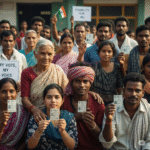In the remote corners of India, where classrooms are sparse and opportunities even scarcer, a quiet revolution is taking root.EdTech startups are empowering first-generation learners—students whose families have never seen the inside of a school—by breaking down the barriers of cost, geography, and accessibility.
For decades, education in rural India has been a privilege, not a right. The children of farmers, laborers, and daily-wage workers have struggled to break free from generational cycles of illiteracy. But now, armed with a smartphone and affordable internet, these first-generation learners are stepping into a world of knowledge their families never imagined.
Affordable Education at Their Fingertips
Traditional schooling often involves costs that rural families cannot bear—tuition, transportation, and study materials. EdTech startups are eliminating these barriers withlow-cost learning platforms.
Fromfree video lecturestobudget-friendly live classes, rural students can now access resources tailored to their needs without having to leave their villages. For families living on daily wages, this accessibility is transformative, allowing education to finally fit into their lives without disrupting their livelihoods.
Learning in Their Language
One of the biggest hurdles for first-generation learners has always been language. Traditional education often fails to connect with students who speak regional dialects.
EdTech startups are bridging this gap withlocalized content—delivering lessons in Bhojpuri, Tamil, Telugu, and other regional languages. By teaching students in their mother tongue, these platforms are making learning more relatable and effective, giving first-generation learners a stronger foundation.
Bringing Mentorship to Rural Homes
For first-generation learners, education isn’t just about books—it’s about guidance. With no one at home to help with studies or career choices, many rural students feel lost.
EdTech platforms are stepping in to fill this void by providingvirtual mentors, live doubt-solving sessions, and career counseling. These tools offer rural students the support they need to navigate their academic journeys, fostering confidence and ambition in a way that traditional classrooms never could.
Challenges on the Path to Change
Despite its promise, the EdTech revolution isn’t without challenges.Device scarcityandpoor internet connectivityremain major roadblocks. Many students rely on shared smartphones and often miss out on live sessions due to weak networks.
Additionally, cultural resistance from families, who view education as a luxury rather than a necessity, adds another layer of complexity. Convincing parents to trust online learning requires building awareness and addressing generational skepticism.
Stories of Transformation
Yet, the impact of EdTech is undeniable. Stories abound of rural students breaking barriers:
- A girl in Bihar becoming the first in her village to pass a competitive exam after attending online coaching.
- A boy in Odisha mastering digital skills through a free coding app and securing a remote internship.
- Entire families celebrating as their children gain access to the opportunities that education unlocks.
These successes aren’t just milestones—they are proof that EdTech is rewriting the story of rural India.
The Way Forward
For EdTech to truly enable first-generation learners, startups must go beyond delivering content. They need to focus on:
- Offline solutions like downloadable lessons for areas with weak connectivity.
- Community engagement to build trust and awareness.
- Device subsidies to ensure every child has the tools they need to learn.
First-generation learners are the torchbearers of change in rural India, and EdTech startups are lighting the way. By empowering these students, they are not just transforming individual lives—they are uplifting entire communities.
The revolution has begun. The question is:How far can we take it?












